While searching for knowledge base solutions, chances are you might have come across KnowledgeOwl. Companies like Frontier Airlines, DevResults, and Inspired eLearning have used KnowledgeOwl to boost their customer support and internal team management.
No matter how impressive KnowledgeOwl looks at first, it may not be the right fit for all businesses.
Honestly, the tool has its set of limitations and has received flak from users for multiple reasons – from expensive plans to the technical glitches that it throws up now and then.
This blog presents the top 10 KnowledgeOwl alternatives that fare well on features, pricing, and usability. Explore their features, pros, and cons, analyze what works well for you, and make an informed decision.
What Is KnowledgeOwl?
KnowledgeOwl was founded in 2011, and since then, it has grown to become one of the leading knowledge base tools in the market.
This cloud-based software is designed to help businesses solve customer support and knowledge management challenges with ease. Equipped with flexible features, the tool lets you build an internal or external knowledge base and tailor it to your needs.
With a simple and clean user interface, KnowledgeOwl is designed for small businesses and startups.
Although KnowledgeOwl works great on various fronts, it scores less on pricing, value for money, and multiple language support, which we will look at in the next section.
Why Look for KnowledgeOwl Alternatives?
KnowledgeOwl is a really good tool – no doubt about that. But we cannot deny the fact that there are certain crucial areas where it falls short.
The tool has a good reporting system, but it’s not that great. The online reviews by users indicate that its reporting offers surface-level information about user behavior. Detailed insights can be gained only by integrating the software with Google Analytics. also only premium plans have unlimited cloud storage.
Others complain about the lack of a conflict warning system. When two editors work simultaneously on a document, it results in overwriting as they are not notified on time.
Pricing is another factor that makes businesses doubtful about this tool. Its basic plan comes at $79/month, that too, with just one author and one knowledge base. Value for money takes a hit here, especially for small businesses who will think twice before shelling out a large amount for a few benefits.
Key Features That KnowledgeOwl Alternative Must Have
Searching for the right KnowledgeOwl alternative might leave you baffled. Different tools come with different features, which makes it all the more difficult to find the one that best fits your needs.
Worry not. We’ve got your back.
For your convenience, we have compiled a list of the top features that KnowledgeOwl alternatives must have.
- Easy to use tool that requires no download or installation and little to no coding knowledge
- Clean and intuitive interface for a seamless experience
- Ready-made knowledge base templates to make the content creation process easier
- User management features for collaborative content authoring and editing
- Access control system for defining member roles and controlling their access
- Modern authoring system that is convenient for users
- A built-in reporting system to monitor and improve knowledge base performance
- Powerful external integrations with ticketing, survey, and live chat tools
- Customization features to tailor the knowledge base to your needs
- SEO capabilities to widen the reach and boost the ranking
- Anytime, anywhere access and compatibility with multiple devices
- AI-powered search to get quick page and article suggestions
Our Selection Criteria for KnowledgeOwl Alternatives
Finding the perfect KnowledgeOwl alternative is an uphill task requiring in-depth research, scanning online reviews, detailed comparisons, checking features, and browsing through dozens of websites.
And we have done it all to present you with nothing but the best. The list of the best KnowledgeOwl alternatives mentioned in the next section is carefully compiled to make the product comparison not easy and free of biases.
We followed the following criteria to bring the best alternatives to KnowledgeOwl right at your fingertips.
-
Core Knowledge Base Features
The top alternatives to KnowledgeOwl should offer core knowledge base features like online editor, reports and analytics, customization, user management, and publishing.
-
Listed on Top Review Websites
The best KnowledgeOwl alternatives should be listed on leading review websites like Capterra, Getapp, G2, and SoftwareWorld.
-
Minimum 10 User Reviews
All KnowledgeOwl alternatives should have at least ten honest reviews on the above-mentioned platforms. Real-time user reviews make analysis and comparison easier.
FREE. All Features. FOREVER!
Try our Forever FREE account with all premium features!
10 Best KnowledgeOwl Alternatives You Should Consider
Getting a KnowledgeOwl alternative makes sense given that there are key areas where the tool lacks. We’ve curated this list of the top KnowledgeOwl competitors so you can easily analyze and compare them.
1. ProProfs Knowledge Base
ProProfs Knowledge Base is a simple yet powerful tool that is intelligently designed for businesses looking to boost their customer support, team collaboration, and internal knowledge management. It can be set up as an external knowledge base for customers or an internal knowledge base for employees.
What makes this cloud-based software the best KnowledgeOwl alternative is its simplicity of use, stellar features that get the job done, and the tremendous value for money it provides.
While it plays a key role in making customers self-reliant through self-service, it is also ideal for keeping teams connected with an internal knowledge base.
Features like AI-powered reports, rich authoring, complete customization, access and security controls, and professionally designed templates make ProProfs Knowledge Base the favorite of large and small businesses.

You Can Use ProProfs Knowledge Base to:
- Reduce customer support tickets by creating a self-service knowledge base
- Improve agent performance by giving them a ready information resource for solving customer issues
- Delight customers with instant, 24×7 self-service
- Manage business knowledge on a central platform and make it conveniently accessible to employees
- Create an environment of knowledge sharing and self-learning in the workplace
- Bring teams together under one roof to create, manage, and share knowledge
Pricing:
There are three plans that ProProfs Knowledge Base offers:
- Essentials – Starts from $49/author/month
- Enterprise – Available on Request
Pros & Cons of ProProfs Knowledge Base
Pros:
- The tool offers a wide range of ready-made templates to create a knowledge base, documentation, user manuals, and much more.
- ProProfs Knowledge Base teams well with sibling tools – ProProfs Help Desk and ProProfs Chat giving a 360° support experience.
- Integrations with third-party tools like Zendesk, Freshdesk, Wufoo, Google Analytics, and many others provide endless possibilities to explore.
- The software is incredibly simple to use. Whether you are a coding expert or a beginner with no coding knowledge, the tool is designed for everyone.
Cons:
- It is not possible to co-edit documents, mark comments, and mention team members.
2. Archbee
Archbee unifies all your company knowledge so your internal teams and external customers can use it easily. This KnowledgeOwl alternative can be used to create a knowledge base, internal wikis, guides, documentation, and a lot more.
Moreover, you can use it for technical and software documentation as well. Its blazing fast editing capabilities, inline comments, custom blocks, and 25+ third-party integrations make it one of the top knowledge base solutions in the market today.
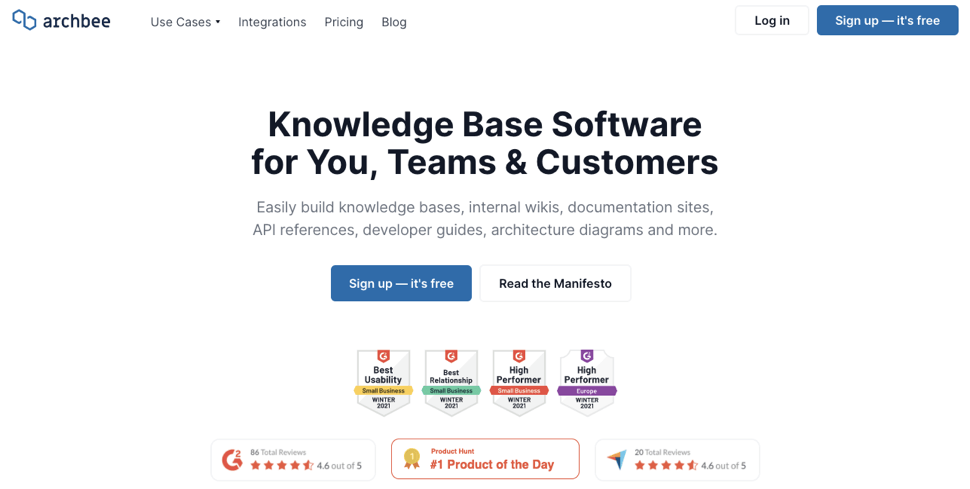
You Can Use Archbee to:
- Create knowledge base content quickly with the tool’s powerful editing capabilities
- Format the content using Markdown shortcuts so that it looks and reads well
- Build technical and software documentation for your tech team
- Keep the knowledge base public or private depending on your target audience
Pricing:
Archbee offers three price plans:
- Free – Basic features at no cost.
- Growing – $20/month
- Scaling – $60/month
Pros & Cons of Archbee
Pros:
- The Knowledge Graph feature links important information together so people can quickly go through it.
- It is possible to mark comments and mention team members in documents.
- Explain concepts better with custom blocks.
Cons:
- Although the tool offers integrations with many tools, popular ticketing, chat, and support software are missing from the list.
- The tool doesn’t offer a mobile app.
- The Scaling plan allows only ten users. You’ve to pay $6 more for every additional user, which makes it a lot more expensive.
3. GetGuru
Guru is specifically built for internal knowledge management. Businesses can use this tool for product enablement and employee onboarding. Marketing, sales, support, and even remote teams use Guru to work efficiently and in collaboration without wasting time in emails, calls, and shoulder taps. It’s AI suggest feature serves contextual suggestions, giving readers instant access to exactly what they need.
With an intuitive interface and modern features, Guru is a solid tool for internal knowledge management and team collaboration.

You Can Use Guru to:
- Keep your business knowledge organized with collections and boards.
- Facilitates access to expert-verified knowledge that employees can trust
- Identify duplicate content and keep the knowledge base updated
- Give real-time knowledge base article suggestions via chat.
Pricing:
KnowledgeOwl offers three price plans:
- Starter – $5/User/Month
- Builder – $10/User/Month
- Expert – $20/User/Month
Pros & Cons of Guru
Pros:
- It’s easy to share knowledge cards in Slack
- Custom Knowledge Triggers allow teams to use the most updated knowledge during work.
- Guru integrates well with tools like Slack, Confluence, and Freshworks, enhancing the overall experience.
Cons:
- Designed mainly for internal teams and has limited capabilities of an external knowledge base.
- Sometimes cards can be difficult to update
- SEO features are missing.
FREE. All Features. FOREVER!
Try our Forever FREE account with all premium features!
4. Tettra
Tettra is an internal knowledge base software that unifies company knowledge so that teams can use it to work better. Its smart workflows help in keeping the information in a centralized space for easy access. The best part about this KnowledgeOwl alternative is that content can be regularly verified by subject matter experts in the company so that teams have updated content at their fingertips.
Being an internal tool, it can be used with Slack to send notifications for new and updated articles or share knowledge quickly, ensuring that all teams are on the same page.
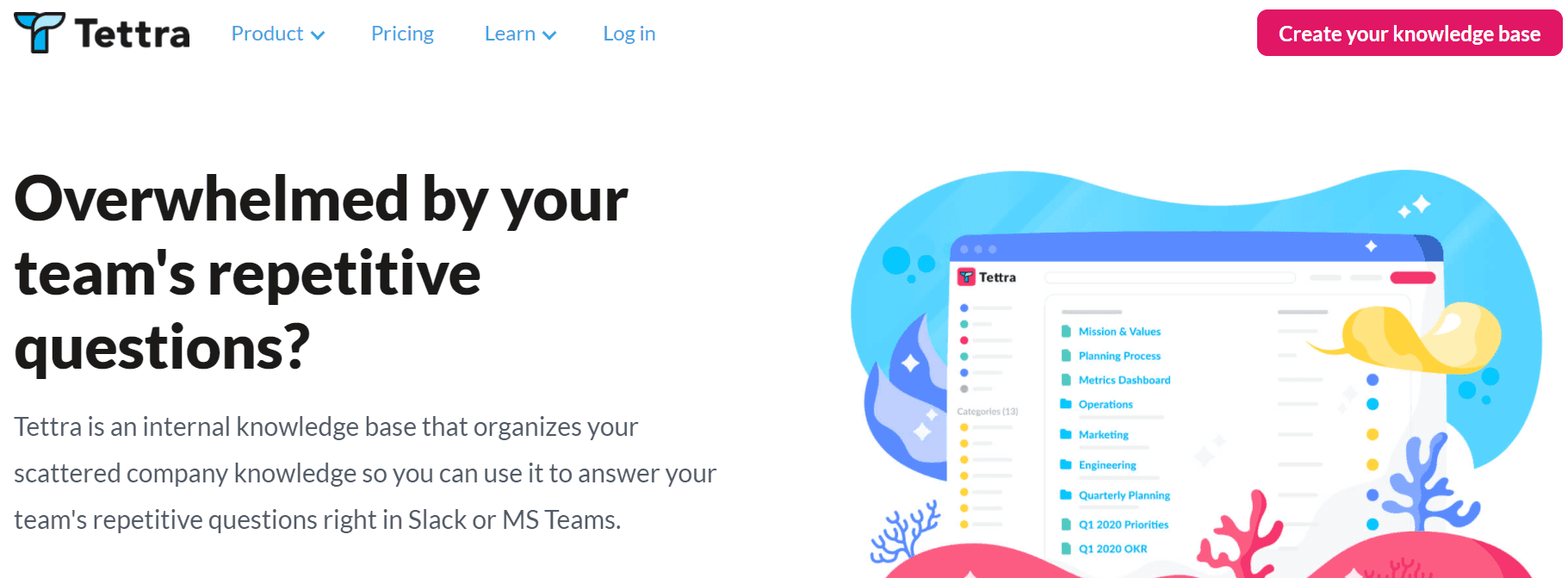
You Can Use Tettra to:
- Create a single source of information that your teams can trust
- Allow teams to suggest ideas, edits, and changes to existing articles
- Provide access to the right people with advanced category permissions
- Reduce repetitive employee questions with 24×7 access to company knowledge
Pricing
Tettra offers three price plans:
- Starting – Starts at $0/5 users/month
- Scaling – Starts at $99/10 users/month
- Enterprise – Available on Request
Pros & Cons of Tettra
Pros:
- With a user-friendly design, the tool is easy to configure.
- Ready-made templates to help you get started with the internal knowledge base
- A powerful search function that scans every nook and corner of the document to bring you relevant results.
Cons:
- Designed only for internal use
- Usage reports are shared via email. They are generated monthly and do not come in graphical or tabular form. Also, only basic information is covered in reports.
5. Bitrix24
Another KnowledgeOwl competitor, Bitrix24, comes with a Document Management System offering unlimited cloud storage and cloud collaboration. Available both on-premise and on the cloud, Bitrix24 is a simple tool with basic features including Document Approval Workflow, Versioning, Local Document Editing, and Password Protection. There are dozens of integrations the tool offers. Moreover, you can create your own apps using REST API.
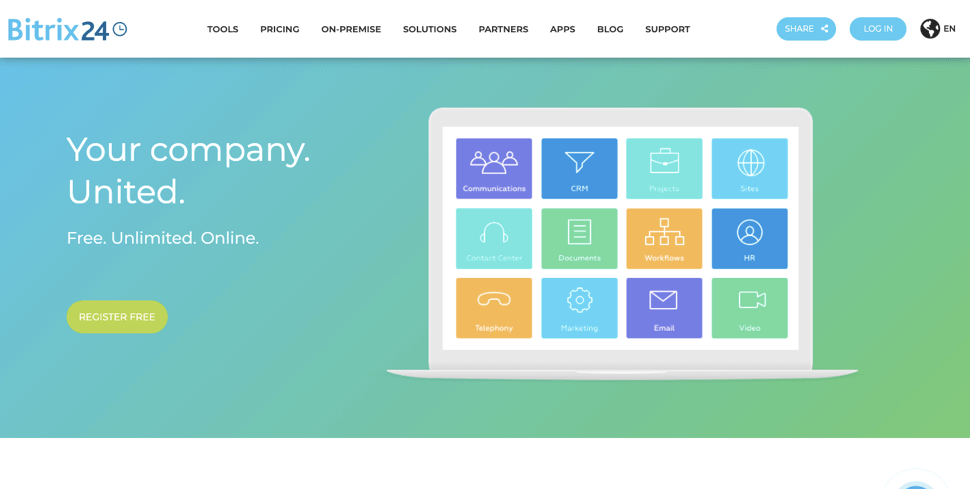
You can Use Bitrix24 to:
- Give granular rights for personal, group, and company drives and folders.
- Set workflows to ensure documents are reviewed before publishing.
- Create a single ecosystem for company communication, task and project management, customer support, and marketing.
- Share files and folders with the public using a secure URL.
Pricing
Bitrix24 comes with three price plans:
- Free – Basic features at $0.
- Special:
- Start+ – $19/2 users/month
- CRM+ – $65/6 users/month
- Project+ – $55/24 users/month
- Business:
- Standard – $79/50 users/month
- Professional – $159/unlimited users/month
Note: All these plans include its Document Management System and other tools like CRM and project management.
Pros & Cons of Bitrix24
Pros:
- It is a complete suite of collaboration, communication, document management, and project management tools.
- Bitrix24 offers free mobile and desktop apps for Android, iOS, Mac, and PC
- It has a simple and basic document management system.
Cons:
- Document management features are not that advanced
- Key features found in modern knowledge base tools are missing.
6. HelpDocs
HelpDocs – the company started in 2016 and since then has grown its internal knowledge base software and served businesses across industries. Similar software to KnowledgeOwl in multiple aspects, but what really gives it an edge is its ease of use and uncomplicated features. The tool offers a comprehensive and visually rich reporting system giving actionable insights into traffic, tickets, article performance, and a lot more.
In a nutshell, this knowledge base software has everything you need to get your knowledge platform up and running.

You can Use HelpDocs to:
- Extend HelpDocs capabilities with a powerful host of third-party integrations
- Make the work of writers easier and better with article blocks and keyboard shortcuts
- Manage and monitor article usage and performance through in-depth reporting
- Segment your content smartly for team members and customers.
Pricing
HelpDocs offers three price plans:
- Start – $49/month
- Build – $99/month
- Grow – $199/month
Pros & cons of HelpDocs
Pros:
- It can be customized completely to suit your needs
- Ideal for companies across industries – e-commerce, healthcare, software, and others.
- Typo-tolerant search that delivers accurate results within seconds
- A simple drag and drop system to add categories, save changes and move articles
Cons:
- Exporting limited to PDF and Excel files
- No option to import data from existing Word files
7. Slite
Built mainly for remote teams, Slite offers a clear structure to make information-gathering a breeze. It removes chaos and infuses clarity in internal processes by centralizing all company knowledge. The solution is best for small and medium businesses looking for smarter and efficient ways to organize and share knowledge within their teams.
With some amazing templates for product planning, onboarding checklist, employee handbook, and more, you can turn your knowledge base ideas into reality.

You can use Slite to:
- Involve teams to create documents collaboratively
- Easily import docs to Slite and speed up the content creation process
- Keep your remote teams connected through centralized knowledge access and sharing
- Stay up to date with tasks and progress with Catch up greets.
Pricing
Slite offers three price plans:
- Free – Basic features at $0.
- Standard – $6.67/user/month
- Enterprise – Available on request
Pros & Cons of Slite
Pros:
- A collaborative platform where teams can express ideas, get feedback, and write content together
- It makes work easier, faster, and better for remote teams
- Ready-made templates to serve different purposes
Cons:
- Limited storage
- Designed for internal team use only
- Basic tables with features like merging rows and columns and adding background color missing.
FREE. All Features. FOREVER!
Try our Forever FREE account with all premium features!
8. Confluence
Confluence is a popular knowledge base tool ideal for remote teams and internal knowledge management. It taps into your team’s collective knowledge and makes it easily available to everyone in the organization. You can plan projects, involve teams, share announcements, and get instant feedback – all on one single dashboard.
The tool offers beautifully crafted templates that prevent you from reinventing the wheel and maintain consistency across all projects and processes.

You Can Use Atlassian Confluence to:
- Create a flexible and collaborative workspace for your remote teams
- Increase team productivity and streamline workflows by integrating the software with your favorite tools
- Organize all your company knowledge into simple pages and spaces
- Notify team members when they are tagged in projects or assigned tasks.
Pricing
Confluence offers four price plans:
- Free – $0 for 10 users
- Standard – $5/user/month
- Premium – $10/user/month
- Enterprise – Available on request.
Pros & Cons of Atlassian Confluence
Pros:
- Real-time editing, commenting, and notifications allow for better collaboration
- The tool gives you a personalized feed where you can get a glimpse of your recent spaces, drafts, in-progress work, and more.
- Integrates with over 3000 marketplace apps.
Cons:
- Built for internal use only
- Export limited to a few file formats.
- Navigation can be a little confusing.
9. Nuclino
Nuclino is another free KnowledgeOwl alternative that works as an internal wiki for your team’s knowledge. Easy to use, fast, and hassle-free, this knowledge base software helps you add life to your content with images, code blocks, and videos.
Teams can collaborate in real-time and see changes right away when someone is typing or editing. What makes Nuclino unique is its ability to organize team knowledge into boards and graphs so that it can be easily navigated.
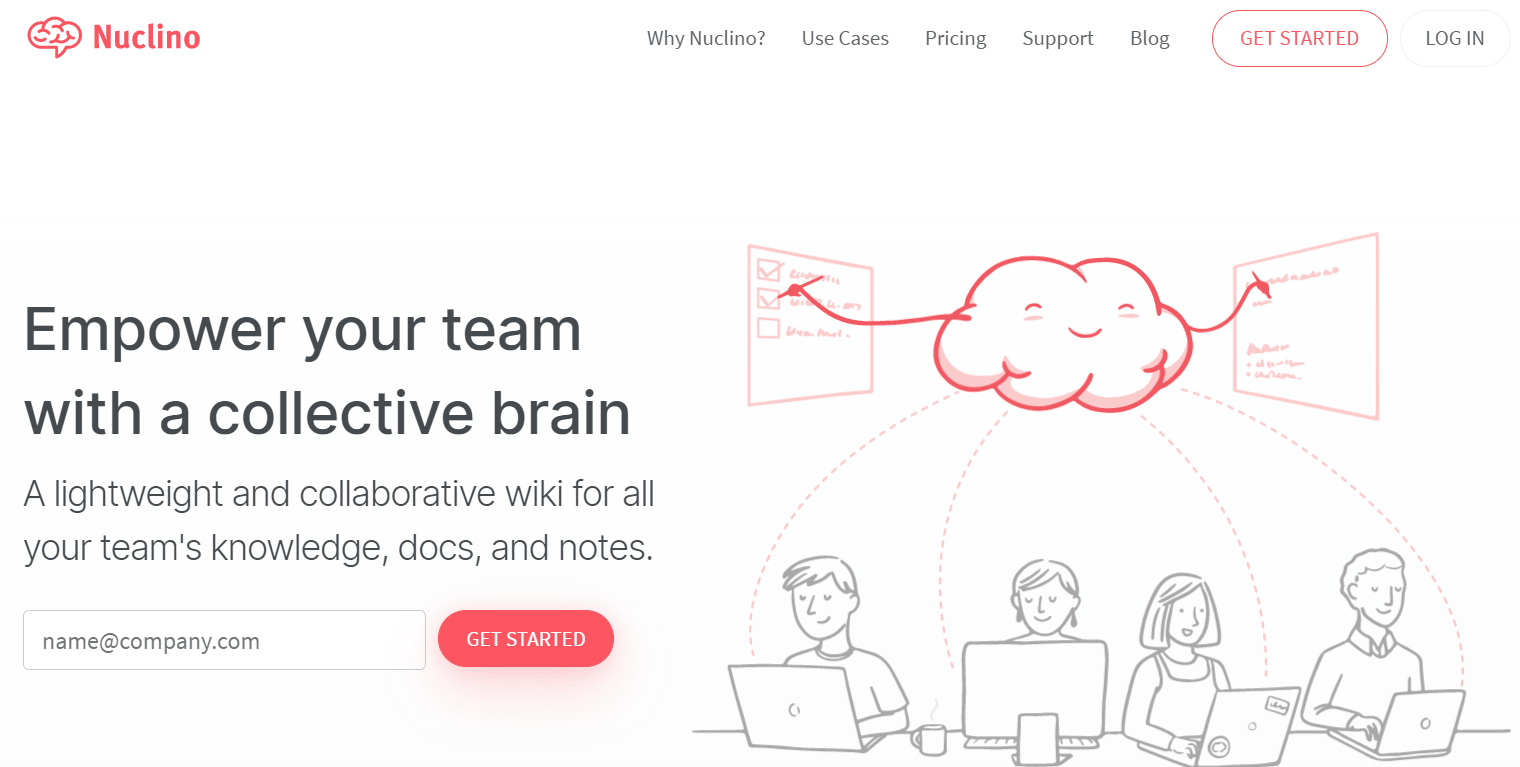
You can use Nuclino to:
- Help your teams create and edit documents together
- Navigate content easily using knowledge graphs and boards
- Organize content in workspaces and clusters
- Integrate with your favorite tools to make work easier for teams.
Pricing
Nuclino offers two price plans:
- Free – $0
- Standard – $5/user/month
Pros & Cons of Nuclino
Pros:
- Unlimited revision history so you can track changes done days or even months back
- Web, desktop, and mobile apps available
- Knowledge can be visualized with graphs, lists, and boards.
Cons:
- Limited storage
- Formatting features need improvement
- Built mainly for internal use.
10. Document360
Document360 is one of the top KnowledgeOwl competitors designed for growing companies. It is quite a versatile tool perfect for creating user guides, technical documentation, internal knowledge base, product help docs, and many more.
Features like a state-of-the-art editor, category manager, and advanced customization help you create, manage, and tailor content – just the way you want. There are visual cues that give a transparent picture of which articles are published, in progress, or still in draft mode.
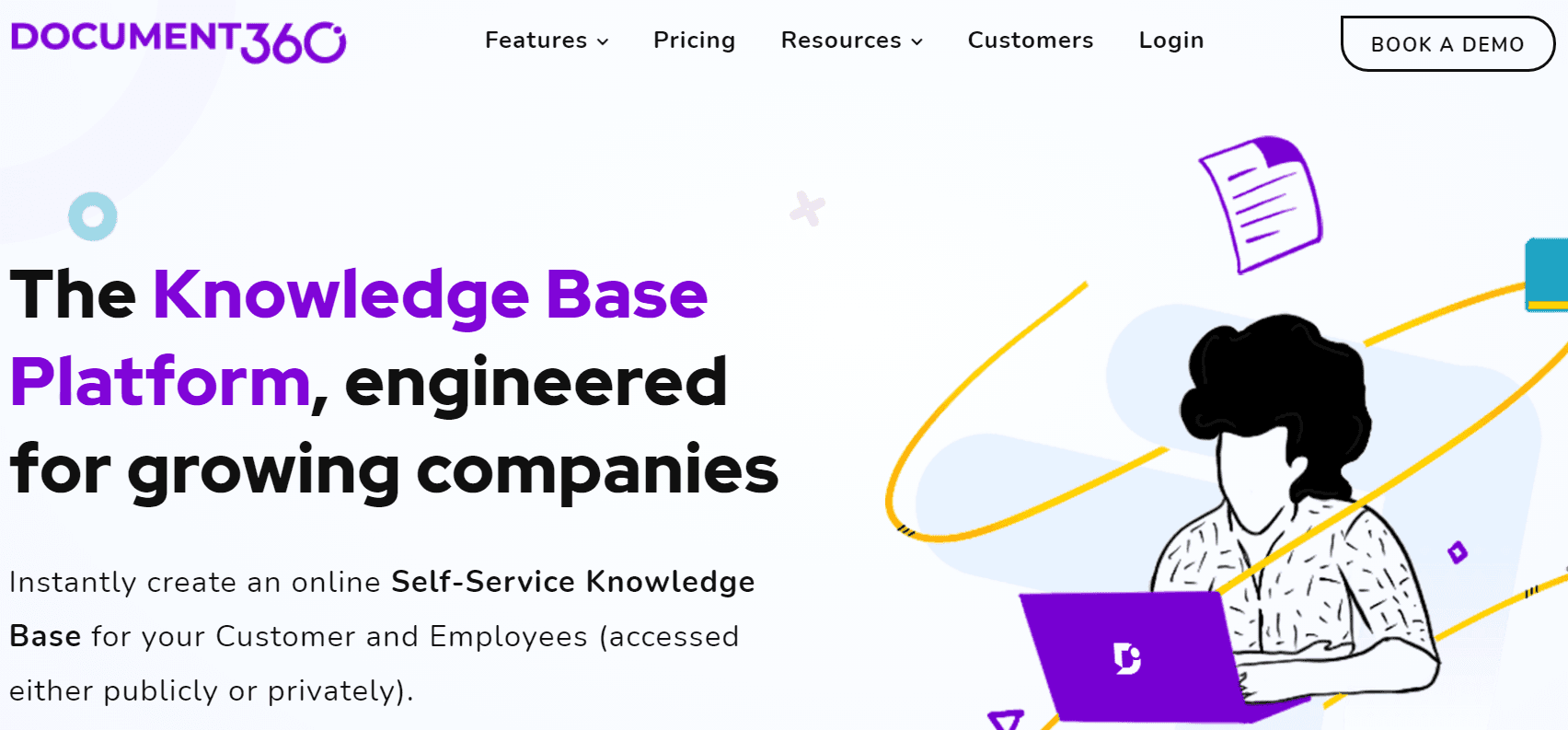
You Can Use Document360 to:
- Provide in-app help using Knowledge Base Assistant.
- Create a public knowledge base for customers and a private knowledge base for employees
- Get a real-time inline preview of the content as you write
- Track performance metrics, search analytics, user feedback, and links analytics
Pricing
Document360 offers four price plans:
- Startup – $49/project/month
- Business – $149/project/month
- Enterprise Plus – Available on Request
Pros & Cons of Document360
Pros:
- AI machine translation to create a knowledge base in multiple languages
- Create multiple knowledge bases with different domain names and branding, and manage them from a single portal.
- Comment on articles, tag team members, and work in collaboration
Cons:
- Limited storage across all plans
- No ready-made templates available
Comparison of Best KnowledgeOwl Alternatives
| Tools | Public and Private Knowledge Base | Ready-to-use templates | User Management, Roles and permissions | Customization | Workflow Approval System | SEO Features | Reports & Analytics | Third-party integrations |
|---|---|---|---|---|---|---|---|---|
| ProProfs Knowledge Base | Yes | Yes | Yes | Yes | Yes | Yes | Yes | Yes |
| Archbee | Yes | Yes | Yes | Yes | No | No | Yes | Yes |
| Guru | Yes | Yes | Yes | No | Yes | No | Yes | Yes |
| Tettra | No (Private only) | Yes | Yes | Yes (No CSS) | No | Yes | Yes | Yes |
| Bitrix24 | No (Private only) | No | Yes | Yes | Yes | No | Yes | Yes |
| HelpDocs | Yes | Yes | Yes | Yes | Yes (Very basic) | Yes | Yes | Yes |
| Slite | Yes | Yes | Yes | No | No | No | Yes | Yes |
| Atlassian Confluence | No (Private only) | Yes | Yes | Yes | No | No | Yes | Yes |
| Nuclino | No (Private only) | No | Yes | Yes | Yes | No | No | Yes |
| Document360 | Yes | No | Yes | Yes | Yes | Yes | Yes | Yes |
FREE. All Features. FOREVER!
Try our Forever FREE account with all premium features!
Which KnowledgeOwl Alternative Should You Go for?
Now that you have a clear idea of KnowledgeOwl and its competitors, it’s time to make a decision.
This is an even more challenging part of the process. Finding the best KnowledgeOwl alternative is as daunting a task as tracing a needle from a haystack.
The above-given list of the best KnowledgeOwl alternatives of 2025 should make your job easier. Compare the alternatives on different parameters – their features, functionality, as well as pricing, and zero in on a tool that best meets your needs.
A piece of advice here – The three crucial areas of comparison are – ease of use, compelling features, and pricing. One tool that fits well in all these categories is ProProfs Knowledge Base. Whether you are a small startup or a multi-million dollar business, the tool has what it takes to boost customer support and internal knowledge management.
As compared to KnowledgeOwl, ProProfs Knowledge Base plans are priced reasonably, giving the best bang for your bucks.
 Tips
Tips
We’d love to hear your tips & suggestions on this article!
FREE. All Features. FOREVER!
Try our Forever FREE account with all premium features!

 We'd love your feedback!
We'd love your feedback! Thanks for your feedback!
Thanks for your feedback!







